Last month we documented selective citations of a survey carried out by the Palestinian Center for Policy and Survey Research in two articles written by Lucy Williamson:
AVOIDING THE ISSUES: BBC’S WILLIAMSON IN JENIN
“She [Williamson] does not clarify that the survey was conducted among 750 participants alone in PA controlled areas or that – as noted by several commentators – the survey showed widespread support for – and denial of – the atrocities perpetrated by Hamas on October 7th:
“We asked the respondents what they thought of Hamas’ decision to launch the October the 7th offensive given its outcome so far, a vast majority (72%; 82% in the West Bank and 57% in the Gaza Strip) said it was a correct decision and 22% (12% in the West Bank and 37% in the Gaza Strip) said it was incorrect. […]
85% say they did not see videos, shown by international news outlets, showing acts committed by Hamas against Israeli civilians, such as the killing of women and children in their homes; only 14% (7% in the West Bank and 25% in the Gaza Strip) saw these videos.
When asked if Hamas did commit these atrocities, the overwhelming majority said no, it did not and only 7% (1% in the West Bank and 16% in the Gaza Strip) said it did.”
WHAT’S MISSING IN LUCY WILLIAMSON’S BBC ‘BRIEFING’ ON SUPPORT FOR HAMAS?
“Once again Williamson fails to inform BBC audiences that – as noted by several commentators – the survey showed widespread support for – and denial of – the atrocities perpetrated by Hamas on October 7th.”
On January 7th the BBC News website published yet another report citing that same survey and this time, the parts missing from Williamson’s articles were reported.
In that item – titled ‘Israel-Palestinian bitterness deepened by Hamas attack and war’ – the BBC Jerusalem bureau’s Yolande Knell platforms a denier of the October 7th massacre: [emphasis added]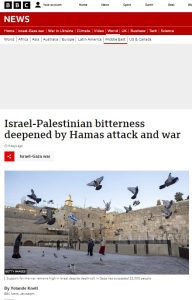
“”I am on Instagram, on X. I follow people from Gaza,” says Haneen, a student nurse. “We all feel so sad.”
But she tells me she doubts Israel’s official version of what happened on the 7th of October.
“We know as Palestinians that Israel used propaganda, so we don’t believe what they say. We know there is some part that’s right, but other parts are not right.”
Her position is common among Palestinians, according to the latest poll carried out in the occupied West Bank and Gaza by the Palestinian Center for Policy and Survey Research.
“The overwhelming majority of the Palestinians do not believe Hamas has committed any atrocities, the overwhelming majority has not seen any videos that show atrocities. Of course, these videos are out there,” says Professor Khalil Shikaki, who oversaw the poll.”
Remarkably, Knell has no observations to make about a society in which “the overwhelming majority” deny self-documented acts of savagery committed by a proscribed terrorist organisation and she provides no explanation for her decision (all the more questionable in light of the prevalence of such denialism in other locations around the world) to amplify such views in her report without clarification on her part of the horrific events that her interviewee seeks to deny.
Knell’s report includes a photograph which clearly has nothing to do with its chosen caption:
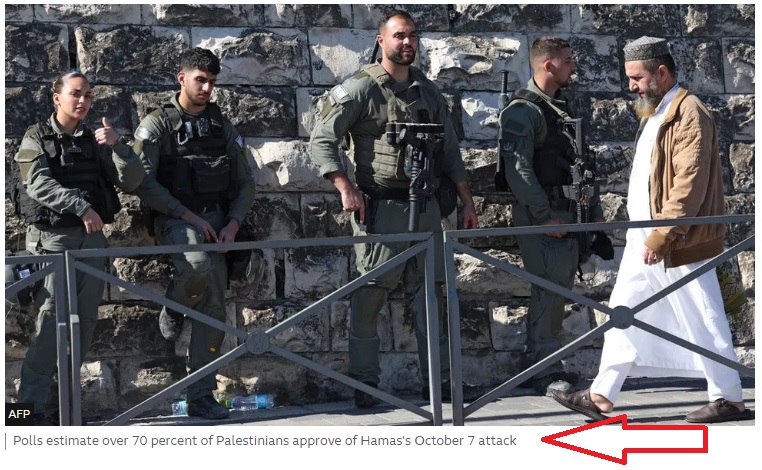
She goes on:
“Most notably, in the survey, 72% of the Palestinian public believed that Hamas’s decision to launch its offensive on 7th October was correct.
A Palestinian shop owner who does not want to give his name tries to explain the reasoning. He accuses foreign media of ignoring the broader context of the long years of blockade imposed by Israel and Egypt after Hamas took over in 2007 and the tough living conditions it created.
“People in Gaza have been living in a big prison,” he tells me.”
Knell fails to challenge that misleading portrayal of “a big prison” and makes no effort to inform her readers that the blockade came about precisely because of terrorism perpetrated by Hamas and other groups in the Gaza Strip before continuing:
“Now he despairs of the international community because it is not doing more to stop the fighting.
“We see difficult things on the TV. Very difficult. Children get killed. Women get killed. Old people get killed with no reason. They didn’t do anything. It’s unbelievable,” the shopkeeper says.
“Honestly, I don’t imagine, how could people be watching these kind of things and they have the power to stop these things? They are watching a Hollywood movie? It’s like nothing [to them]?””
Once again Knell has nothing to say about a society in which an overwhelming majority “approve” of an invasion and brutal massacre of civilians including babies, children, women and senior citizens but “despairs” when the inevitable response from a sovereign country responsible for the protection of its population becomes “very difficult” to watch “on the TV”.
Knell’s report also includes unqualified amplification of claims made by the terrorist organisation that started the war:
“Meanwhile, Israel’s air and ground assaults in the Palestinian territory have killed about 23,000 people, the Hamas-run health ministry in Gaza says. The vast majority of Gaza’s 2.3 million residents have been forced to flee their homes amid widespread destruction.”
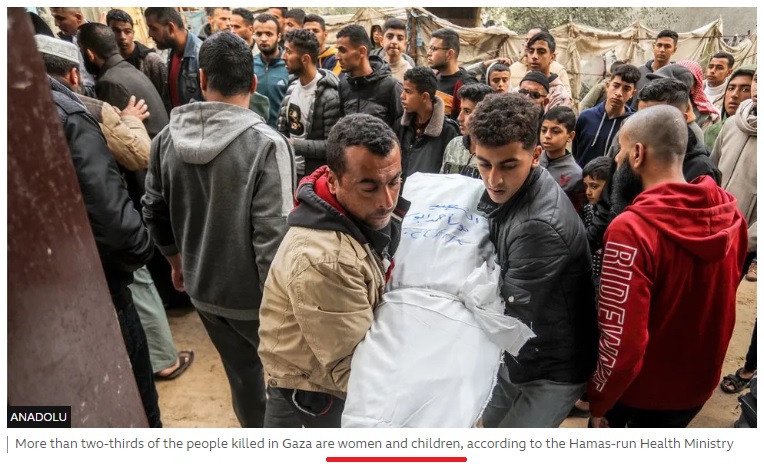
Readers are not informed that the BBC has not verified the casualty figures and breakdowns that it quotes and no mention is made of the fact that the health ministry run by the terrorist organisation Hamas deliberately avoids distinguishing between combatants and civilians for propaganda purposes or of Israel’s estimate that around 8,000 terrorists have been killed during its operations in the Gaza Strip.
Despite her mention of Gaza residents “force to flee their homes”, Knell makes no mention of the hundreds of thousands of Israelis also displaced from their homes in the south or the north:
“The attacks of the 7th of October killed some 1,200 people in southern Israel. More than 100 of the 240 hostages who were snatched and taken to Gaza remain in captivity.”
Knell’s Jerusalem vox pop report also cites another poll.
“Meanwhile, most Israelis are not focused on the killing of Palestinian civilians and back their country’s military offensive to crush Hamas and bring home hostages, polls suggest.”
The main image illustrating Knell’s report includes the following clumsily phrased caption:
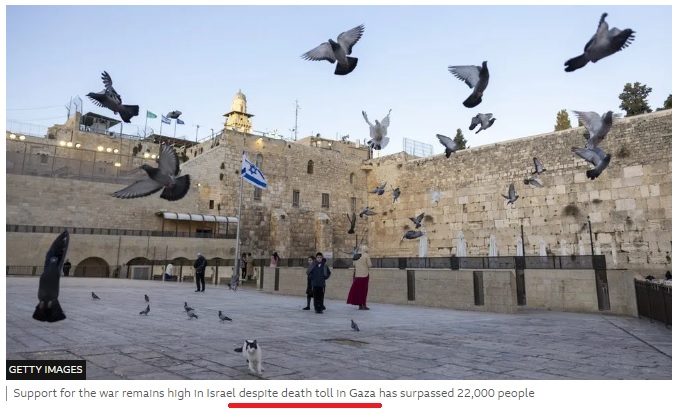
Following her uncritical citation of Hamas-provided casualty figures in the Gaza Strip, Knell goes on:
“Yet, last week, a poll by the Israel Democracy Institute (IDI) found that two-thirds of Israelis did not think Israel should agree to demands from the US to shift to a phase of the war that reduces heavy bombing in densely populated areas.
“People who want to see what is happening in Gaza can see it via the internet,” says leading IDI pollster, Professor Tamar Hermann, referring to the human suffering. “But the media is not bringing to our living rooms the same images as people see in Europe or other states in the world.”
She adds that scenes of Gazan civilians celebrating the 7th of October assault undermined public sympathy in Israel.
“Unlike in previous military operations, the civilians are not perceived here as innocent bystanders. The sympathy is quite low,” Prof Hermann says.”
Knell fails to inform her readers that, unlike those dependent on foreign media outlets including her own, the Israeli public is well aware of the issue of Hamas’ use of civilian facilities such as private homes, mosques, hotels, schools, universities, clinics and hospitals for the purpose of terrorism.
Knell’s ostensibly ‘balanced’ report is based on two polls – one Israeli and one Palestinian – and four vox pop interviews – two with Israelis and two with Palestinians. Her chosen narrative of “bitterness” on both sides and her promotion of false equivalence between the views of massacre deniers who believe that Hamas “was correct” to launch its October 7th attack and those of Israelis who understand only too well the implications and consequences of such attitudes is ample indication of her deliberate avoidance of any serious discussion of the background to the findings of that poll by the Palestinian Center for Policy and Survey Research.

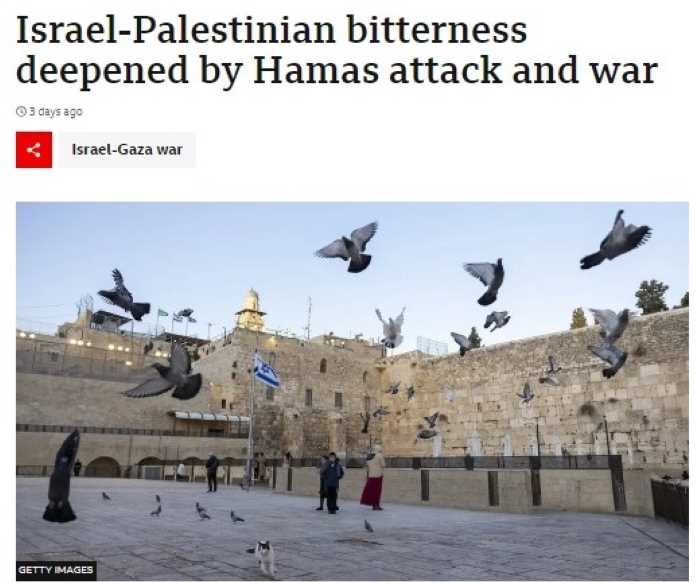

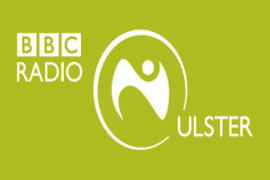
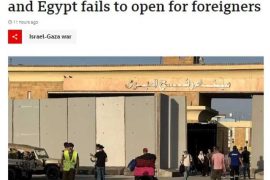

So it was both the correct decision but never happened, but Knell didn’t spot the incongruity. It is an outrage that license-fee payers are paying good money for this one-sided grabage.
So it was both the correct decision but never happened, but Knell didn’t spot the incongruity. It is an outrage that license-fee payers are paying good money for this one-sided garbage.